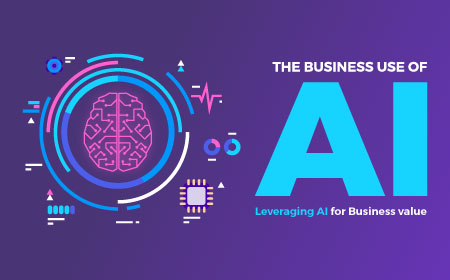
[wptabs][wptabtitle]Overview[/wptabtitle][wptabcontent]
The Business use of Artificial Intelligence (AI)
Leveraging AI for Business Value
While flashy or exotic applications of artificial intelligence (AI) and other related automation approaches get a lot of press, there are many simple AI approaches that yield business value. The key to success in AI is an awareness of what technologies fit your organization needs. Applying AI technology and concepts to everyday processes makes the work easier, more reliable, and more productive.
Understanding, organizing, integrating and delivering AI is a key issue today. Business must be clear about the use and value of AI to avoid chasing an unachievable and expensive dream. Applying an incremental approach to using AI builds on the understanding that small scope opportunities have a high degree of success.
AI is a collection of technologies that recognize patterns. The patterns replace the tedium people must do in support of a process. Identifying these points of opportunity is the link to applying small and effective AI solutions.
Small projects also provide the insight regarding how well AI is absorbed into the every-day operation. AI carries with it many implications. Jobs change dramatically and current skills may become obsolete and displaced. There may be resistance to change and unrealistic fear of robots taking over as well. However, the positive side promises better paying work, newer and more interesting tasks and less physically demanding and boring operations.
Managers and professionals should prepare for the coming changes. What can we expect from AI capabilities today? What may happen in the future? Answers for these and other questions are part of the value of this course.
[/wptabcontent] [wptabtitle]Benefits of attending[/wptabtitle][wptabcontent]
Expected Learning Outcomes:
- Explain the different uses of AI today
- Understand the techniques used for the different types of AI capability
- Define a roadmap to reach effective use of AI
- Explaining the technology available for AI
- Interpret how AI can help the business
- Select appropriate AI techniques for the business
- Understand the limits of AI
- Suggest operational opportunities for AI
[/wptabcontent] [wptabtitle]Who should attend[/wptabtitle][wptabcontent]
Who should attend
This course is key for business managers, strategic planners, marketing analysts, data analysts and architects, planning managers, process analysts, business analysts, business architects, enterprise and IT architects or anyone interested in the value proposition of AI.
* No previous knowledge of AI is required.
[/wptabcontent] [wptabtitle]Your trainer[/wptabtitle][wptabcontent]
Meet your expert course trainer: Frank Kowalkowski
 Frank Kowalkowski is President of Knowledge Consultants, Inc., a firm focusing on business performance, business analytics, data science, business architecture, big data, business intelligence, predictive analytics and statistical techniques. He has over 30 years of line management and consulting experience in a wide variety of industries. He has been involved with many projects both as a user and purveyor of business analytics. He has worked projects in state and federal government dealing with back office operations, legislative compliance and regulatory compliance. He has worked on the federal level with the national defense department, Coast Guard for drug interdiction and other projects. His background includes a number of industries including manufacturing, distribution, supply chain, banking, insurance, financial institutions, health care, pharmaceuticals, oil and gas and chemicals.
Frank Kowalkowski is President of Knowledge Consultants, Inc., a firm focusing on business performance, business analytics, data science, business architecture, big data, business intelligence, predictive analytics and statistical techniques. He has over 30 years of line management and consulting experience in a wide variety of industries. He has been involved with many projects both as a user and purveyor of business analytics. He has worked projects in state and federal government dealing with back office operations, legislative compliance and regulatory compliance. He has worked on the federal level with the national defense department, Coast Guard for drug interdiction and other projects. His background includes a number of industries including manufacturing, distribution, supply chain, banking, insurance, financial institutions, health care, pharmaceuticals, oil and gas and chemicals.
More recently Frank has been involved in conducting workshops, professional training sessions and assessments of architecture, data science, governance, compliance, risk and process management efforts. He also develops algorithms for analytics tools particularly semantic algorithms as well as data analysis techniques. He is often a keynote speaker, panel moderator and member at international conferences as well as a conference chair, he has written numerous papers and spoken at conferences on a variety of business subjects. He conducts frequent seminars nationally and internationally on a variety of business management, analytics and information technology topics.
He is the author of a 1996 book on Enterprise Analysis. His most recent publications are a featured chapter in the business book “Digital Transformation: Using BPM You Already Own.” for publication in 2017. His chapter is titled “Improve, Automate, Digitize”, he also has a chapter in the business architecture book titled ‘Business and Dynamic Change’ June, 2015 and a chapter on semantic process analytics in the book Passports to Success in BPM published in 2014 all are available on Amazon. [/wptabcontent][wptabtitle]Course Outline[/wptabtitle][wptabcontent]
Day 1
Session 1 – It’s all about patterns
Section 1.1: Artificial Intelligence today
- What do we mean by AI?
- What is the AI value proposition?
- Machine learning versus neural nets
- Video Discussion – AI Today
Section 1.2: AI Techniques – Neural Nets & Machine Learning
- Why a neural net?
- What do you get from a net?
- How they work
- The idea of machine learning
- Statistical analytics
- Video Discussion – Understanding Neural Nets
Session 2 – What kind of patterns?
Section 2.1: Image and facial recognition
- The technique of image recognition
- Uses of image recognition – compliance, crime detection, law enforcement
- Imaging and retail – store layout, shelf space analysis
- Issues with image recognition
- Topic Discussion – Uses of facial recognition
Section 2.2: Speech Recognition
- What drives speech recognition?
- Uses of speech recognition – e.g. voice assistants, virtual assistants
- NLP – Natural Language Processing
- Issues in speech recognition
- Video discussion – Can you depend on text analytical results?
Day 2
Session 3 – More patterns
Section 3.1: Text Analytics
- The technique of text analytics
- Uses of semantic recognition analytics –
- Keyword and related phrase extraction
- Detecting emotions in text –
- sentiment analysis, summaries, content extraction
- Issues in text analytics
- Interactive Demonstration – Keyword analysis
Section 3.2: Mapping patterns in data – Deep learning
- What is deep learning about?
- Deep learning and visual recognition, e.g. medical detection
- An example: Fraud detection
- Trusting deep learning results
- Interactive Demonstration – Sentiment analysis and AI
Session 4 – Applying AI to the Organization
Section 4.1: Operationalizing AI
- Linking AI capability into processes
- Intelligent process automation, analytics and insight
- Machine learning and BPM analytics
- Processes and chatbots
- Limits to AI linkages
- Video Discussion – AI and BPM
Section 4.2: Added uses of AI in the Organization
- Management application of AI to the workplace
- Integrating AI in products and services
- Emerging uses of AI
- Buyer behavior:
- ‘People who bought this also bought that’
- Demo and Discussion – Understanding Buyer Behavior
Day 3
Session 5 – Planning for AI
Section 5.1: Identifying AI Risk
- What technologies should you use?
- Where are the candidates for AI?
- Matching opportunities with technologies?
- Developing risk factors
- The risk 4 – box assessment
- Understanding AI risk
- Exercise – Understanding AI Risk
Section 5.2: The AI Roadmap
- Setting up the problem – what is your AI goal?
- What infrastructure will you need?
- The AI portfolio
- Exercise – Identifying your AI Goals
Session 6 – Understanding the Impact of AI
Section 6.1: The promise of AI
- Impact of the AI on the future of jobs
- What work will be gone?
- What work will remain?
- What new work might emerge?
- Exercise – What Job in Your Organization Might go Away?
Section 6.2: Summary – Implications of AI
- AI and the 4th IR
- What are the Economic Implications?
- What is Needed of Government?
- What Happens to Industry?
- Final Q and A
Final Q and A
[/wptabcontent][wptabtitle]About KCI[/wptabtitle][wptabcontent]
Knowledge Consultants. Inc. (KCI)
 Knowledge Consultants, Inc. is a professional services firm founded in 1984. KCI provides consulting and professional education services. With over 50 courses taught worldwide, KCI provides the opportunity to develop core strengths in the following certification areas:
Knowledge Consultants, Inc. is a professional services firm founded in 1984. KCI provides consulting and professional education services. With over 50 courses taught worldwide, KCI provides the opportunity to develop core strengths in the following certification areas:
- Process Management
- IT Management
- Business Performance Management
- Business Analysis
- Analytical Techniques for Business
- Business and IT Architecture
KCI has expanded its training and consulting efforts internationally into Europe, Southeast Asia and the Middle East. KCI has an outstanding list of current and past clients including many of the Fortune’s 100 companies. Consulting focuses on the key areas of Artificial Intelligence, Big Data, Business Performance Management, Process Management, Business and IT Architecture, Business Analysis, Using Analytic Techniques for Performance Improvement and IT Management.[/wptabcontent][wptabtitle]Pricing Details[/wptabtitle][wptabcontent]
[showprices]
[/wptabcontent][/wptabs]
Download Brochure and Articles
To learn more and view the course outline fill the form below to download the brochure and related articles.
[email-download download_id=”268,334″ contact_form_id=”208″ format=1]
